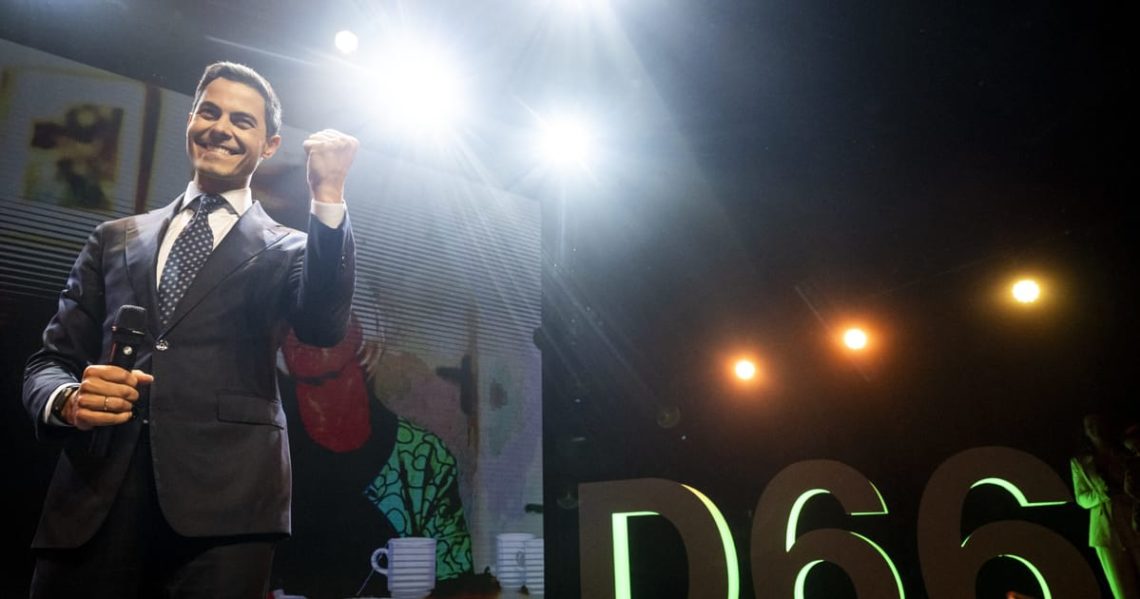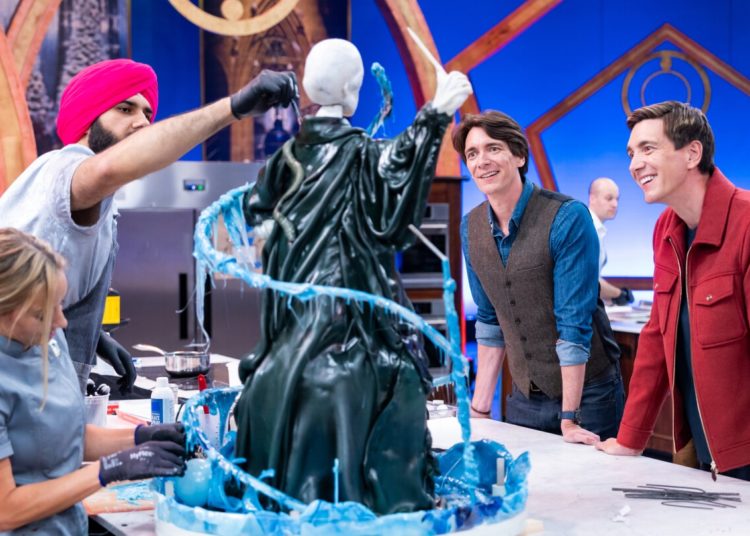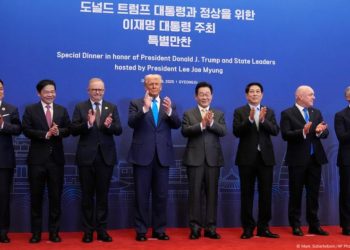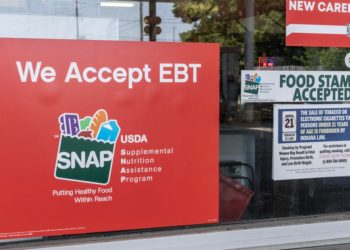BRUSSELS — Wednesday’s election in the Netherlands should surely go down as one of the best days Europe’s centrists have enjoyed in years.
Geert Wilders, the far-right populist who touted leaving the EU on his way to a shock victory in the 2023 election, lost nearly a third of his voters after 11 chaotic months for his Party for Freedom (PVV) in coalition.
At the same time, the fervently pro-European liberal Rob Jetten surged in the final days of the campaign and stands a good chance of becoming prime minister. At 38, he would be the youngest person to hold the office since World War II and the first openly gay candidate ever to do so.
“Many in the Brussels bubble will welcome the rise of a mainstream, pro-governing and reform-oriented party,” said one EU diplomat, granted anonymity because the subject is politically sensitive. “The Dutch have a lot to contribute to the EU.”
But even as they exhale with relief at the end of the Wilders interlude, the inhabitants of Europe’s dominant liberal center-ground — those Brussels officials, diplomats and ministers who run the EU show — would be well advised not to celebrate too hard.
If previous years are any guide, the final shape of the next government and its policy plans will not become clear for months.
Who knows what will have happened in Ukraine, the Middle East, or in Donald Trump’s trade war with China in that time? “It is essential for European cooperation that a new government is stable and able to make bold decisions, given the current geopolitical challenges that Europe is facing,” the same diplomat said.
Even when the new coalition finally begins its work, this election should worry Europe’s liberal centrists almost as much as it delights them.
Jetten into Europe
Jetten’s Democracy 66 party has never done so well at a Dutch election: Assuming he gets the job he wants, he’ll be the party’s first prime minister. This week he told POLITICO he wanted to move the Netherlands closer to the EU.
Last night, officials in Brussels privately welcomed the prospect of the Dutch and their highly regarded diplomats returning to their historic place at the center of EU affairs, after two years in which they lost some influence.
It was always going to be tough for the outgoing PM Dick Schoof, a 68-year-old technocrat, to follow the long-serving Mark Rutte, an EU star who now runs NATO. Domestic divisions made his job even harder.
But pro-European spirits also rose because the disruptive Wilders had wanted to keep the EU at arm’s length. Jetten’s position could hardly be more different. In fact, he sounds like an EU federalist’s dream.
“We want to stop saying ‘no’ by default, and start saying ‘yes’ to doing more together,” Jetten told POLITICO this week. “I cannot stress enough how dire Europe’s situation will be if we do not integrate further.”
Staying Dutch
In Brussels, officials expect the next Dutch administration to maintain the same broad outlook on core policies: restraint on the EU’s long-term budget; cracking down on migration; boosting trade and competitiveness; and supporting Ukraine, alongside stronger common defense.
One area where things could get complicated is climate policy. Jetten is committed to climate action and may end up in a power-sharing deal with GreenLeft-Labor, which was led at this election by former EU Green Deal chief Frans Timmermans.
How any government that Jetten leads balances climate action with improving economic growth will be key to policy discussions in Brussels.
European Commission President Ursula von der Leyen has been trimming climate measures amid center-right complaints that they are expensive for consumers and businesses. But she wants to secure backing for new targets to cut greenhouse gas emissions by 2040.
Elsewhere, housing and migration — two areas often linked by far-right politicians — were central issues in the Dutch campaign. Both will continue to feature on the EU’s agenda, too.
For many watching the results unfold in Brussels, the biggest concerns are practical: Will the next Dutch government be more stable than the last one? And how long will it take to for the coalition to form? Seven months passed between the last election in November 2023 and Schoof taking office as prime minister in July 2024.
“This is a historic election result because we’ve shown not only to the Netherlands but also to the world that it’s possible to beat populist and extreme-right movements,” Jetten told his supporters. “I’m very eager to cooperate with other parties to start an ambitious coalition as soon as possible.”
Wilders
Beneath the rare good news of a pro-European triumph and a far-right failure lurk more worrying trends for EU centrists.
First of all, there’s the sheer volatility of the result. Most voters apparently made up their minds at the last moment.
Wilders went from winning the popular vote and taking 37 of the 150 seats in the Dutch lower house in 2023 to a projected 26 seats this time. Jetten’s D66 party, meanwhile, went from just nine seats two years ago to a projected 26, according to a preliminary forecast by the Dutch news agency ANP.
The center-right Christian Democratic Appeal took just five seats in 2023 but now stands to win 18, according to the forecast. With swings this wild, anything could happen next time.
Most major parties say they won’t work with Wilders in coalition now, making Jetten the more likely new PM if the projections hold. But Wilders says he is a long way from finished. “You won’t be rid of me until I’m 80,” the 62 year-old told supporters.
In fact, Wilders might find a period in opposition — free from the constraints and compromises required in government — the perfect place to resume his inflammatory campaigns against Islam, immigration and the EU.
Donald Trump, Marine Le Pen and Nigel Farage had all been written off before storming back into their respective political front lines.
“We had hoped for a different outcome, but we stood our ground,” Wilders wrote on X. “We are more determined than ever.”
Timm’s up
The other cloud on the pro-European horizon is the fate of Timmermans.
His center-left ticket was expected to do well and had been polling second behind Wilders’ Freedom Party in the months before the vote.
But per the preliminary forecast, GreenLeft-Labor will fall from 25 seats to 20. Timmermans — who also stood in 2023 — resigned as leader.
It wasn’t just a defeat for the party, but also in some ways for Brussels. Timmermans had served as the European Commission’s executive vice president during von der Leyen’s first term, and was seen by some, especially his opponents, as a creation of the EU bubble.
Others point to the fact the center-left is struggling across Europe.
“It’s clear that I, for whatever reason, couldn’t convince people to vote for us,” Timmermans said. “It’s time that I take a step back and transfer the lead of our movement to the next generation.”
Jetten’s pro-Europeanism could also come back to haunt him by the time of the next election. If he fails to deliver miracles to back up his optimistic pitch to voters, his Euroskeptic opponents have a ready-made argument for what went wrong.
Recent history in the Netherlands, and elsewhere, suggests they won’t be afraid to use it.
Eva Hartog, Hanne Cokelaere, Pieter Haeck and Max Griera contributed reporting.
The post Dutch election favorite Rob Jetten is the EU’s dream appeared first on Politico.




